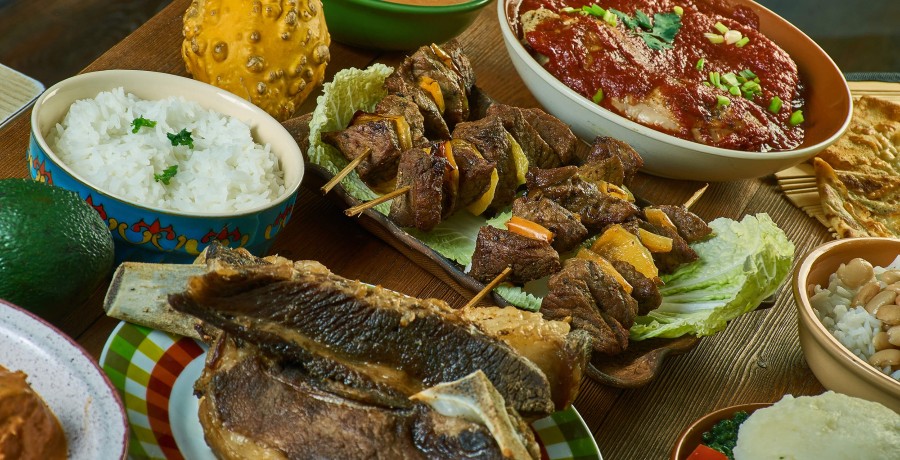Tanzania’s Food and Drink Scene: A Culinary Journey Through the Flavors of Tanzania
Tanzania’s food and drink scene is a vibrant and diverse culinary journey that takes visitors through a variety of flavors and tastes. The country’s unique cultural heritage and diverse geography have led to the development of a rich and eclectic culinary tradition that draws inspiration from local ingredients, spices, and cooking methods.
In this blog post, we will explore the flavors and tastes of Tanzania’s food and drink scene, the ingredients and cooking methods used in Tanzanian cuisine, and recommend some of the must-try dishes and drinks that visitors should experience during their culinary journey through Tanzania.
At Yup Africano we highly recommend booking customized group trips in Dubai with us to get best deals and a personalized experience travelling to the country. However f travelling in group and packing makes you feel overwhelmed then our packing tips and tricks blog will be highly useful to you.
Tanzanian Cuisine in Short
A Fusion of Cultures and Flavors Tanzanian cuisine is a fusion of African, Arab, and Indian influences, which have resulted in a unique culinary tradition that is characterized by bold and spicy flavors, rich stews, and grilled meats. The use of spices, such as cardamom, cumin, and coriander, is central to Tanzanian cuisine and adds depth and complexity to the dishes.
One of the most popular dishes in Tanzania is ugali, a maize flour porridge that is a staple food in many African countries. Ugali is typically served with grilled or stewed meat, such as beef, chicken, or goat, and a variety of vegetables, such as sukuma wiki, a leafy green vegetable similar to collard greens.
Another popular dish in Tanzania is pilau, a fragrant rice dish that is flavored with spices, such as cardamom, cinnamon, and cloves, and typically served with a stew or grilled meat. Other popular dishes in Tanzania include samosas, chapati, and biryani, which reflect the Indian influence on Tanzanian cuisine. When you book a Tanzania holiday packages from Dubai with Yup Africano we can arrange a local cooking tour or a class for you which will be a very enriching experience for you.
Ingredients and Cooking Methods
The use of fresh and locally sourced ingredients is a fundamental aspect of Tanzanian cuisine. Ingredients such as cassava, plantains, yams, and sweet potatoes are commonly used in Tanzanian dishes, as well as a variety of meats, including beef, goat, and chicken. Fish and seafood are also popular in coastal regions.
The cooking methods used in Tanzanian cuisine vary depending on the dish and the region. Grilling is a popular method of cooking meat in Tanzania, while stews and soups are commonly simmered slowly over low heat to develop rich flavors. In coastal regions, seafood is often prepared by grilling or frying, while vegetables are commonly stir-fried or boiled.
Although different types of meat are primary and staple diet of most local people still vegans and vegetarian can make special request with the team Yup Africano in advance to make arrangements for delectable meals that blend with your taste preferences. Book your Tanzania safari package from Dubai with us for a personalized experience. Offering personalized vegan meals is one of the main reasons why Yup Africano is counted among one of the best tour companies in UAE and GCC region.
Tanzanian Drinks
A Refreshing Blend of Flavors Tanzania’s drinks scene is equally diverse and offers a refreshing blend of flavors and tastes. One of the most popular drinks in Tanzania is chai, a spiced tea that is made with a blend of tea leaves, milk, and spices, such as cinnamon, cardamom, and ginger. Chai is typically served sweetened with sugar and is a popular beverage throughout Tanzania. The Tanzania tea will give you a distinct experience from Indian and Arabic teas this should be one main reason for you to book your holiday packages from Dubai to Tanzania right away.
Another popular drink in Tanzania is the locally brewed beer, such as Serengeti, Kilimanjaro, and Safari. These beers are made with locally sourced ingredients, such as barley and hops, and offer a refreshing and crisp taste that is perfect for a hot day.
For those looking for non-alcoholic options, Tanzania offers a variety of fresh fruit juices, such as mango, passionfruit, and pineapple, which are commonly sold by street vendors and in local markets.
Must-Try Dishes and Drinks in Tanzania
Visitors to Tanzania should not miss the opportunity to try some of the country’s signature dishes and drinks. Some of the must-try dishes include:
Ugali: This staple food is a must-try for anyone visiting Tanzania. It is typically served with grilled or stewed meat and a variety of vegetables.
Pilau: This fragrant rice dish is a staple in Tanzanian cuisine and is influenced from Arab and Indian settlers in the region. Although traditionally this dish contains meat you can ask for a preparation fo your preference in advance.
Nyama Choma: Grilled meat is a popular dish in Tanzania, and nyama choma is a must-try. It is typically made with beef, goat, or chicken, and is marinated with spices before being grilled over an open flame.
Samosas: These savory pastries are a popular snack in Tanzania and are typically filled with spiced vegetables or meat.
Chapati: This Indian-influenced flatbread is a popular side dish in Tanzania and is made with flour, water, and oil.
When it comes to drinks, visitors should not miss out on trying:
Chai: This spiced tea is a staple in Tanzanian cuisine and is typically sweetened with sugar. It is a perfect beverage to enjoy with a meal or on its own.
Locally brewed beers: Tanzania has a variety of locally brewed beers, such as Serengeti, Kilimanjaro, and Safari. These beers are refreshing and perfect for a hot day.
Fresh fruit juices: Tanzania offers a variety of fresh fruit juices, such as mango, passionfruit, and pineapple, which are commonly sold by street vendors and in local markets.
Sustainable Food and Drink Practices in Tanzania
In recent years, Tanzania has also made significant efforts to promote sustainable food and drink practices. One of the most notable initiatives is the Kilimanjaro Sustainable Coffee Partnership, which works with local farmers to promote sustainable coffee farming practices and improve the quality of coffee produced in the region. You can include a visit to a sustainable agro-processing facility in your Tanzania tour packages from Dubai.
Tanzania is also home to a number of eco-friendly and sustainable food and drink establishments. For example, the Tanzania Coffee House in Stone Town is a coffee shop that serves locally grown and sustainably sourced coffee, while also supporting local farmers and cooperatives.
Conclusion
Tanzania’s food and drink scene is a unique and diverse culinary journey that offers a fusion of flavors and tastes influenced by African, Arab, and Indian cultures. Visitors to Tanzania should not miss the opportunity to try some of the country’s must-try dishes and drinks, such as ugali, nyama choma, chai, and locally brewed beers. Tanzania has also made significant efforts to promote sustainable food and drink practices, making it a great destination for environmentally conscious travelers.







